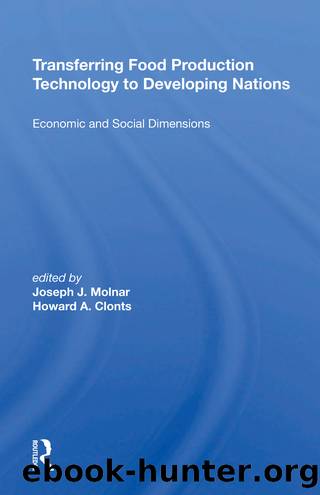Transferring Food Production Technology To Developing Nations by Joseph J Molnar

Author:Joseph J Molnar [Molnar, Joseph J]
Language: eng
Format: epub
ISBN: 9780367215040
Barnesnoble:
Publisher: Taylor & Francis
Published: 2020-09-30T00:00:00+00:00
7
Risks and Information: Farm Level Impediments to Transforming Traditional Agriculture
Terry Roe
The body of evidence accumulated over the last decade generally supports Schultz's hypothesis of many years ago that "there are comparatively few significant inefficiencies in the allocation of factors and production in traditional agriculture." It also appears that farmers in traditional agriculture are fairly quick to adjust to the use of new methods of production if their welfare can be enhanced as a consequence. Surveying the literature on the adoption of food production technology, Ruttan concluded that the new wheat and rice varieties were adopted at exceptionally high rates in those areas where they were technically and economically superior to local varieties.1 Perrin and Winkelman's review of CMMYT sponsored studies on the adoption of wheat and maize varieties and fertilizer use arrived at a similar conclusion.2
The evidence implies that significant increases in resource productivity must come from the increased use of chemical, biological and mechanical technology, i.e., manufactured inputs. However, studies of traditional agriculture also reveal that farmers tend to be risk averse, and that returns to resources tend to vary depending on farmers' experience, cognitive ability, and access to information.
This chapter focuses on these factors as impediments to transforming traditional agriculture from a situation where farmers supply the bulk of their own inputs to a situation where they employ manufactured inputs. The household dimension of the transformation process, though important, is basically left to a future paper.
The chapter is organized by first discussing how farmers' perceptions (understanding) of the production characteristics of manufactured inputs, their cognitive ability, and access to information can give rise to resistance or impediments to substituting new for traditional technologies. Then, the conceptual approach and results from studies of Tunisian wheat and Thai rice farmers are presented to provide further--though still limited--insights into these impediments. Indications of these results to transforming traditional agriculture conclude the paper.
Download
This site does not store any files on its server. We only index and link to content provided by other sites. Please contact the content providers to delete copyright contents if any and email us, we'll remove relevant links or contents immediately.
Harry Potter and the Goblet Of Fire by J.K. Rowling(3075)
Never by Ken Follett(2905)
Shadow of Night by Deborah Harkness(2729)
Ogilvy on Advertising by David Ogilvy(2692)
Zero to IPO: Over $1 Trillion of Actionable Advice from the World's Most Successful Entrepreneurs by Frederic Kerrest(2434)
Machine Learning at Scale with H2O by Gregory Keys | David Whiting(2314)
The Man Who Died Twice by Richard Osman(2307)
Book of Life by Deborah Harkness(2272)
How Proust Can Change Your Life by Alain De Botton(2266)
My Brilliant Friend by Elena Ferrante(2231)
0041152001443424520 .pdf by Unknown(2228)
The Tipping Point by Malcolm Gladwell(2206)
How to Pay Zero Taxes, 2018 by Jeff A. Schnepper(2106)
Will by Will Smith(2060)
Purple Hibiscus by Chimamanda Ngozi Adichie(1992)
Hooked: A Dark, Contemporary Romance (Never After Series) by Emily McIntire(1992)
Borders by unknow(1791)
Rationality by Steven Pinker(1773)
Daughter of Smoke and Bone by Laini Taylor(1750)
